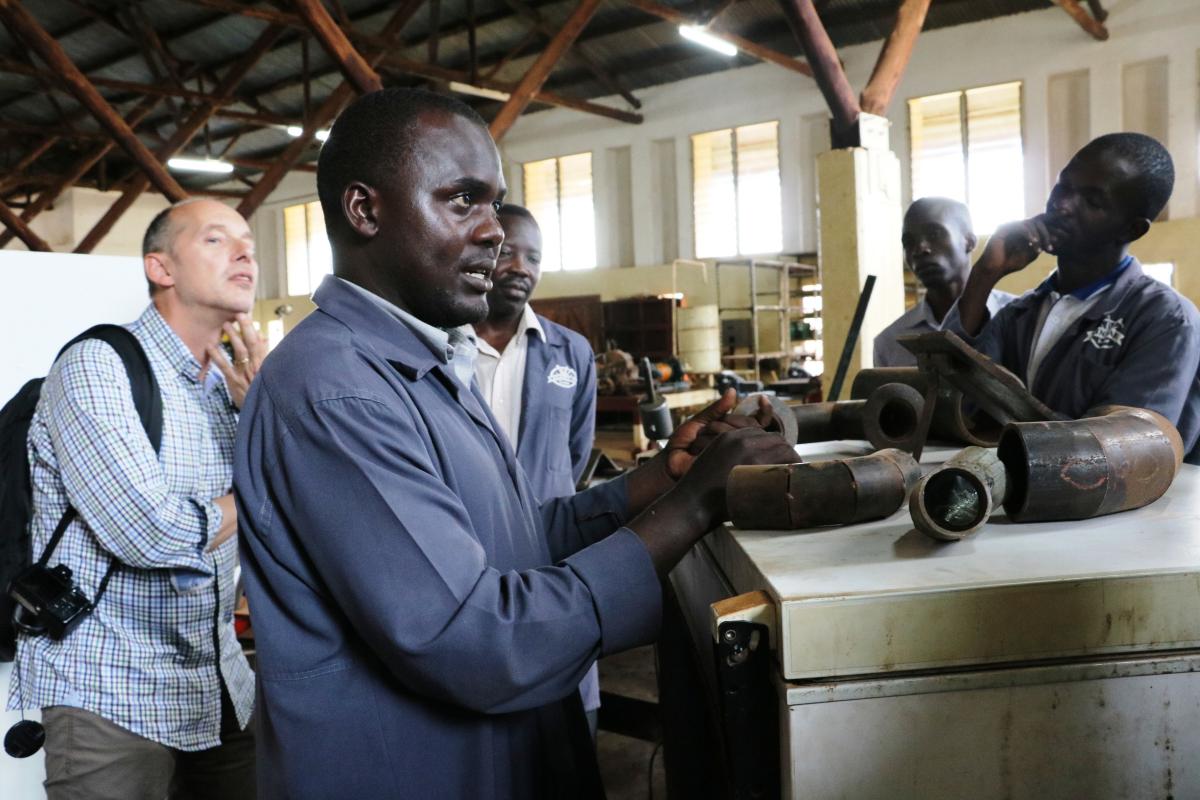BTC Uganda and the Flemish Employment Service partner up: “We want to assist the Skilling Uganda project in becoming a success”
Two employees of the
Flemish Employment Service (VDAB) recently visited Uganda to share their
expertise on vocational training. The visit is a scoping mission for the Support
to the Implementation of the Skilling Uganda Strategy intervention supported by
the Belgian government. VDAB will examine how they can best assist BTC in
supporting five selected vocational training centres in becoming 'centres of
excellence'.
The scoping mission is the first in a
new partnership between BTC and the Flemish Employment Service (VDAB). “We want
to get a better understanding of the BTVET sector in Uganda. We met principals,
trainers and students in different vocational training centres to get an idea
of the current needs,” says Carlo De Smedt from the Flemish Employment Service.
His colleague Bartelijne van den Boogert adds: “We want to see this BTC project
become a success and have a positive impact on vocational training in Uganda.”
The mission focused on five BTVET-institutions : Kasese
Youth Polytechnic in Kasese, St. Josephs Virika Vocational Training Institute in
Fort Portal, Millennium Business School in Hoima, St Simon-Peter Vocational Training
Institute in Hoima and Kyema Uganda Technical College in Masindi. They are selected
as pilot institutions for the intervention in West-Uganda, an area that is
preparing for oil exploitation in the coming years. According to Mr. De
Smedt one of the biggest challenges the project faces is seeing the bigger
picture. “We should not assume that these five institutions share the same
problems as every other Ugandan BTVET centre. We have to take regional
differences into account.”
New ideas
VDAB has a lot of experience when it comes to
the Flemish labour market, but can their expertise also be of value in a
Ugandan context? Ms van den Boogert firmly believes so: “With our background
in career guidance and as a service provider for BTVET we can bring a fresh set
of eyes to the table. We will share our success stories and lessons learned and
most of all show people that they can accomplish a lot, even on a micro level.”
“Therefore we are also grateful that the VDAB
colleagues participated in a training organized by the International Training
Center of the International Labour Organization (ITC-ILO)”, says Eliot
Arinaitwe, the coordinator of the SSU intervention. Together with colleagues
from Namibia, the Netherlands, etc. the VDAB colleagues shared their first hand
experiences in training for employment. “Making BTVET more relevant for the
needs of the local labour market is key to the paradigm shift Skilling Uganda
wishes to accomplish. The five selected institutions are not always aware of
how to get this collaboration with the private sector going. Given their
experience in Belgium, we hope that VDAB can share some first-hand ideas on how
to broker these partnerships," Mr. Arinaitwe continued.
Listen to your peers
Ms van den Boogert acknowledges that working
with the private sector is important but also stresses that the different
training centres can learn a lot from each other: “I think it would be of great value to the
selected institutions to go and visit one another. It will provide a good way
to give constructive feedback and allow for learning opportunities. It can be
very enriching to listen to peers, and most of all it is doesn’t have to be
threatening since everyone is in the same boat. Those peer-to-peer moments are
currently missing.”
Now that this first Ugandan mission has come to
an end, VDAB and SSU will have to think about the way forward. “We need to
draft a strategic plan with all the partners involved,” says Mr. De Smedt. “Back in Belgium we will inform our colleagues about the details of our
mission and work as ambassadors to promote the cooperation between us and BTC
from within the VDAB.” In a later stage this could mean that VDAB experts with
specific vocational skills will visit the different BTVET-institutions and try
to transfer these skills upon the local trainers, where and if relevant.
True motivation
Asked about what she will definitely remember
from this mission Ms. van den Boogert had but one word in mind: “dedication,”
she said. “The principals and trainers at the vocational
centres could easily be discouraged by the challenging circumstances they are
working in. But instead of giving up, they stay committed to the cause of
creating high quality vocational training. You have to admire people for that
and we will do our best to further cultivate this intrinsic motivation.”
Latest news from this project
No news

